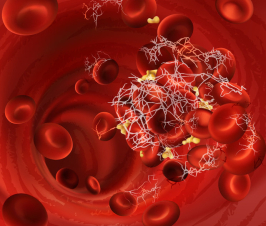Dr. Ashley Burkman, ND
Dr. Lauren Young, ND
Proactive Probiotics
Allergies have been on the rise with as many as 1 in every 5 Americans being diagnosed with some form of an allergic condition. There has been speculation around the over sterilization of our environment as a major contributing factor in this increase in allergies. Washing dirt from foods, antibacterial soaps and the use of antibiotic medicines all have their place in our modern day society, however, have been altering the types of beneficial “bugs” that live on and within us.
Supportive Bacteria is Symbiotic
It has been well-documented there are more beneficial, or probiotic, flora that cover our bodies than there are human cells! With such large numbers of bacteria populating our body, why is it we are not continually succumbing to infections? The answer is these supportive bacteria are considered symbiotic, they cannot survive without us and we cannot survive without them. These beneficial proboitics help with digestion of food, absorption of nutrients, preventing illness and even produce vitamins. These symbiotic bacteria actually crowd out and kill off pathogenic, or infective, types of bacteria, helping keep us healthy.
Reducing Harmful Bacteria Reduces Beneficial Bacteria Causing Dysbiosis
Unfortunately, when we attempt to reduce dangerous bacteria, we also reduce the normal beneficial bacteria that we need to survive. This can cause a situation called dysbiosis, an unbalance amount of healthy and non-healthy bacteria. It has been found that when our normal flora is down in number, we are at a greater risk of potentially pathogenic bacteria and fungi to start to take residence, and there the problem begins.
Immune System Relies on Information from Digestive Flora
Our immune system relies on information from our digestive flora. This information tells the cells that fight off infections weather to relax or to be on guard. When the information being relayed is that of inflammation and attack, the immune system becomes over stimulated and over reactive. This is the link between digestive flora balance and allergic reactions.
Allergic reactions are an over reaction to things that should not always be considered dangerous. Pollen, mold, foods can all become the catalyst that causes the immune system to over react and mount a full on war, releasing histamines that cause the common allergy symptoms. Seasonal allergy sufferers know how annoying symptoms can be with itchy eyes, sinus congestion and fatigue. These types of reactions can be deadly, especially in the case of food allergies. Probiotic flora has been shown to help desensitize, or reduce allergy reactions once they have developed, however, there are studies revealing ways for these allergies to be prevented before you are even born! (Inoue, Y., Shimojo, N., 2014)
Probiotics, Pregnancy and Allergies
Exposure to specific strains of proboitic flora in utero is showing promise in the reduction in allergic histamine reactions in children. Supplementation with a strain of Lactobacillus reuteri at week 36 of pregnancy and to the infant up to 1 year of age was associated with a reduction in allergies up to age 2. (Forsberg, A. et al, 2013)
Breast Milk and Probiotic Flora
Breast milk is a major source of probiotic flora for a developing infant. The type and quantity of probiotic flora in breast milk depends on maternal exposure. Women supplemented with Lactobacillus reuteri, from week 36 gestation until delivery, were found to have a reduction in TGF-beta 2 in their breast milk. (Forsberg, A. et al, 2013) TGF-beta is protein responsible for developing organs, however, when over stimulated can cause the immune system to over react, therefore, increasing incidence of allergic responses. Offspring were followed up to 2 years of age. Findings revealed the lower the protein TGF-beta 2 in the breast milk the lower the incidence of allergies.
There are a multitude of factors at play in the development of allergies, but what cannot be ignored is the importance of proboitic flora in the regulation and development of the immune system. While hygiene practices cannot be overlooked, reducing the sterility of the environment is a great place to start in balancing probiotic flora and reducing the risk of allergic development.
References:
- Böttcher, M.F., Abrahamsson, T.R., Fredriksson, M., Jakobsson, T., Björkstén, B. Low breast milk TGF-beta 2 is induced by Lactobcillus reuteri supplementation and associates with reduced risk of sensitization during infancy. Pediatric Allergy and Immunology.2008;(6):497-504.
- Forsberg, A., Abrahamsson, T.R., Björkstén, B., Jenmalm, MC. Pre-and post-natal Lactobacillus reuteri supplementation decreases allergen responsiveness in infancy. Clinical and Experimental Allergy,2013; 434-42.
- Inoue, Y., Shimojo, N., Microbiome/microbiota and allergies. Springer Seminars in Immunopathology.October 18, 2014.
 Dr. Ashley Burkman received her Doctor of Naturopathic Medicine degree from the National University of Health Sciences in Chicago. She is deeply rooted in classical naturopathic medicine, practicing the belief that the human body has an innate ability to heal itself. She works with patients toward lifestyle adjustments in order to bring about long-term health. Viewing the body as an integrated whole and addressing all aspects of what determines health is the cornerstone of both naturopathic medicine and Dr. Burkman’s practice.
Dr. Ashley Burkman received her Doctor of Naturopathic Medicine degree from the National University of Health Sciences in Chicago. She is deeply rooted in classical naturopathic medicine, practicing the belief that the human body has an innate ability to heal itself. She works with patients toward lifestyle adjustments in order to bring about long-term health. Viewing the body as an integrated whole and addressing all aspects of what determines health is the cornerstone of both naturopathic medicine and Dr. Burkman’s practice.
Dr. Ashley Burkman is a licensed naturopathic physician in the state of Connecticut. Commitment to the growth of her profession has lead her to participate in the several campaigns to expand the scope of practice of naturopathic physicians in several states. She is also a member of both the Connecticut Naturopathic Association and American Association of Naturopathic Physicians.
Dr. Burkman, an Iowa native, enjoys perusing local farmers markets, spending time with friends and family, and searching for new hiking trails to conquer. She attends comedy shows and baseball games regularly and has a soft spot for cats.
Dr. Burkman and Dr. Lauren Young practice as fully licensed Naturopathic Physicians at Connecticut Natural Health Specialists, LLC, in Manchester, CT. Most major health insurances accepted. New patients are encouraged to call for an appointment.
 Dr. Lauren Young studied health psychology at the University of Connecticut and was involved in research on cardiovascular health at UCONN Medical Center. She received her doctorate in naturopathic medicine from the University of Bridgeport. Dr. Young has studied in many integrative settings, from acupuncture for detoxification at Lincoln Memorial Hospital to naturopathic care at Yale affiliated Griffin Hospital.
Dr. Lauren Young studied health psychology at the University of Connecticut and was involved in research on cardiovascular health at UCONN Medical Center. She received her doctorate in naturopathic medicine from the University of Bridgeport. Dr. Young has studied in many integrative settings, from acupuncture for detoxification at Lincoln Memorial Hospital to naturopathic care at Yale affiliated Griffin Hospital.
Dr. Young is a board certified licensed naturopathic physician in the state of Connecticut and has a family practice in Manchester. She lectures extensively through the Greater Harford area and writes for the Natural Nutmeg as well as the National Naturopathic board exams and the National MS Society. Dr. Young is clinical faculty for the residency program at Manchester Hospital, teaching conventional physicians the importance of natural medicine for the University of New England. She uses her expertise in nutrition, botanical medicine, homeopathy and functional medicine along with conventional diagnostic skills and laboratory tests to offer individualized treatments for patients of all ages. Dr. Young specializes in autoimmune, GI and endocrine conditions as well as oncology and immunology. In her spare time, Dr. Young enjoys being a mother and wife, knitting, yoga and raising backyard chickens. She is very passionate about rescue animals and patient advocacy.
Dr. Young and Dr. Ashley Burkman practice as fully licensed Naturopathic Physicians at Connecticut Natural Health Specialists, LLC, in Manchester, CT. Most major health insurances accepted. New patients are encouraged to call for an appointment.

















